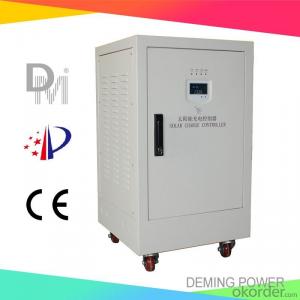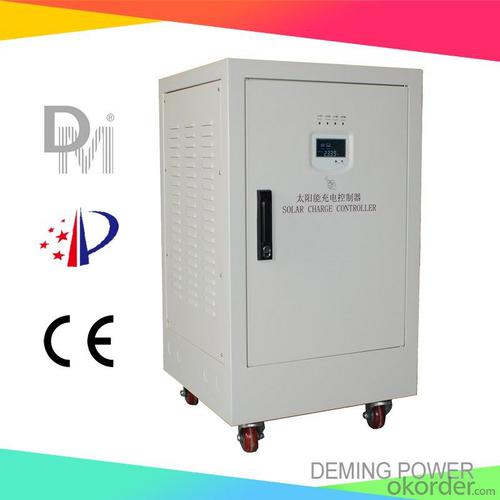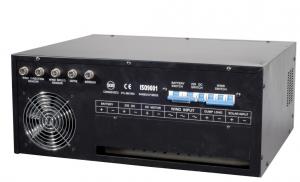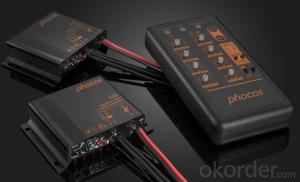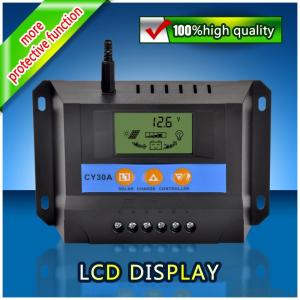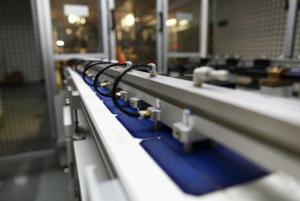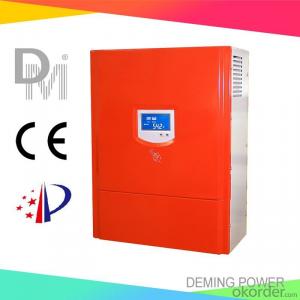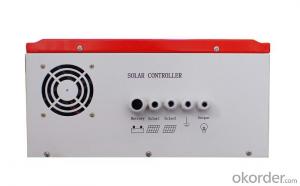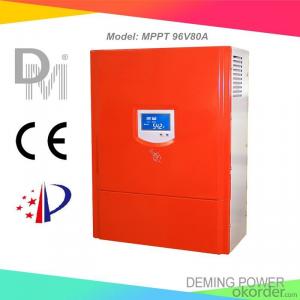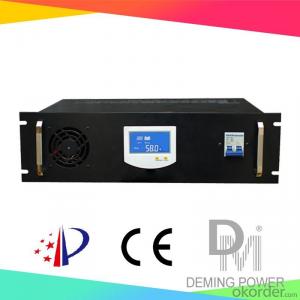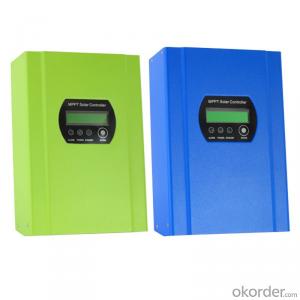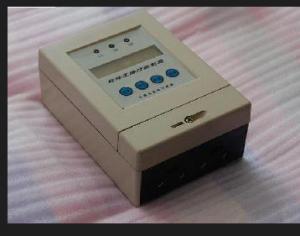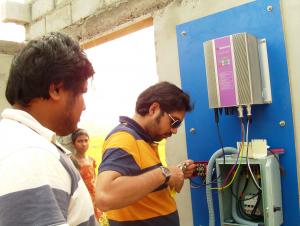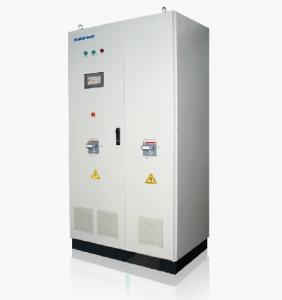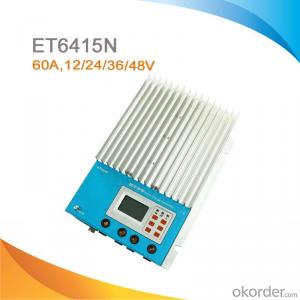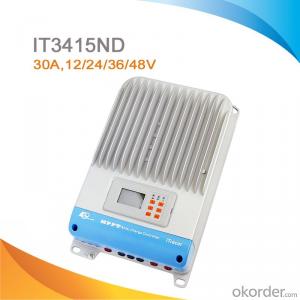Victron Solar Controllers MPPT Solar Charge Controller 96V 200A for Solar Power System
- Loading Port:
- Qingdao
- Payment Terms:
- TT OR LC
- Min Order Qty:
- 1 PCS
- Supply Capability:
- 500 PCS/month
OKorder Service Pledge
OKorder Financial Service
You Might Also Like
Properties of the solar charge controller
1. Design for off-grid solar power system.
2. Applicable to different kinds of batteries.
3. Adopts MPPT technology (Maximum Power Point Tracking). The advanced tracking algorithm make the solar module operate at ideal voltage which the solar modules can produce the maximum available power.
4. Modular design with simple structure and easy maintenance.
5. Automatic power control function.
6. LCD display: Solar panel current, solar panel voltage, solar panel power, battery group voltage, charge current.
7. Perfect protection function: Solar reverse charge protection, Solar reverse connection protection, Battery reverse connection protection, Battery overcharge protection, Battery over current protection etc ,thus the system has higher reliability.
Technical parameters of the solar charge controller
Model | 96V200A | |||||
Battery group rated voltage | 96Vdc | |||||
PV Rated current | 200A | |||||
PV open circuit voltage | 400V | |||||
PV Max. power | 19200Wp | |||||
Input PV module road number | 1 | |||||
Function | MPPT charge mode, auto stop charge, auto recharge voltage; Protection: connecting contrary, over current, short circuit, over heat etc. | |||||
Display mode | LCD | |||||
Display content | solar panel voltage, solar panel current, solar panel power, battery voltage, charge current | |||||
MPPT DC voltage range | 80-116Vdc | |||||
Floating Charge Voltage (adjustable) | 110Vdc | |||||
Stop charge voltage | 116Vdc±1% | |||||
Recharge voltage | 108V±1% | |||||
Voltage drop between PV and battery | 1.5V | |||||
Max itself power consumption | 100mA-150mA | |||||
Work environment temperature | -30-60°C | |||||
Relative humidity | 90% No condensation | |||||
Applicable altitude | 3000m The rated power should be reduced when it is higher than 2000m | |||||
Noise (1m) | 40dB | |||||
Degree of protection | IP20(Indoor) | |||||
Cooling method | Forced air cooling | |||||
*Communication interface (optional) | RS485/USB/GPRS/Ethernet | |||||
*Temperature compensation(optional) | -4mv/°C/2V,-35°C~+80°C,Accuracy:±1°C | |||||
Product size (mm) | 900*500*500mm | |||||
Product Weight(kg) | 50kg | |||||
*Above parameter only for reference. Could be custom made to user specifications.
- Q: Can a solar controller be used with a solar-powered agricultural system?
- Yes, a solar controller can be used with a solar-powered agricultural system. A solar controller helps regulate the charging and discharging of batteries in the system, ensuring optimal performance and prolonging battery life. It helps manage the flow of electricity from the solar panels to the agricultural equipment, allowing for efficient and reliable power distribution in the system.
- Q: Can a solar controller be used with a solar-powered ventilation system?
- Yes, a solar controller can be used with a solar-powered ventilation system. A solar controller helps regulate the charging and discharging of batteries in a solar system, ensuring efficient use of solar energy. In the case of a solar-powered ventilation system, the solar controller can help manage the power supply to the system, ensuring optimal performance and extended battery life.
- Q: Can a solar controller be used for both off-grid and grid-tied systems?
- No, a solar controller cannot be used for both off-grid and grid-tied systems. Off-grid systems require a solar controller to regulate the charge of batteries, whereas grid-tied systems do not require battery storage and therefore do not need a solar controller for this purpose. The functionalities and requirements of solar controllers vary depending on the specific system type.
- Q: How do solar controllers protect batteries?
- Solar controllers protect batteries by regulating the flow of electricity from the solar panels to the batteries. They prevent overcharging by monitoring the battery voltage and disconnecting the panels when the battery is fully charged. Additionally, they prevent deep discharge by disconnecting the load from the battery when its voltage drops below a certain threshold, thus prolonging battery life and ensuring its optimal performance.
- Q: Can a solar controller be used in a solar-powered medical equipment system?
- Yes, a solar controller can be used in a solar-powered medical equipment system. A solar controller regulates the voltage and current from the solar panels to ensure efficient charging and protection of the batteries used in the system. It helps in preventing overcharging, overdischarging, and other electrical issues, making it a crucial component for reliable operation of solar-powered medical equipment.
- Q: Can a solar controller be used with both battery-based and grid-tied solar systems?
- Yes, a solar controller can be used with both battery-based and grid-tied solar systems. A solar controller, also known as a charge controller, is responsible for regulating the flow of electricity from the solar panels to the batteries or grid. In a battery-based solar system, the controller ensures that the batteries are charged efficiently and prevents overcharging or damage to the batteries. In a grid-tied solar system, the controller helps regulate the electricity flow from the solar panels to the grid, ensuring that the energy is being used efficiently and conforming to the grid's requirements. Therefore, a solar controller can be used in both battery-based and grid-tied solar systems to optimize energy production and usage.
- Q: Can a solar controller be used in a solar-powered airship?
- Yes, a solar controller can be used in a solar-powered airship. A solar controller helps regulate the flow of electricity from solar panels to the battery or other power storage devices. In a solar-powered airship, the solar controller would play a crucial role in efficiently managing the power generated by the solar panels and ensuring that it is properly stored and utilized for the various electrical systems and propulsion of the airship.
- Q: Can a solar controller be used with solar panels that have different voltages?
- No, a solar controller cannot be used with solar panels that have different voltages. The solar controller is designed to regulate and optimize the flow of electricity from the solar panels to the batteries or grid. If the solar panels have different voltages, it can lead to compatibility issues, inefficient charging, or even damage to the solar controller or batteries. It is important to ensure that the solar panels used with a solar controller have matching voltages for proper functioning.
- Q: Can a solar controller be used in a hybrid solar panel system?
- Yes, a solar controller can be used in a hybrid solar panel system. A solar controller, also known as a charge controller, is responsible for regulating the voltage and current from the solar panels to the batteries or grid. In a hybrid solar panel system, which combines both solar and other energy sources like wind or grid electricity, a solar controller is still necessary to manage the charge from the solar panels. It helps ensure that the batteries are properly charged and protected from overcharging or excessive discharging. Additionally, a solar controller can also monitor and optimize the energy flow between the different energy sources in a hybrid system, maximizing the efficiency and utilization of the solar power generated.
- Q: Are there any safety concerns with using a solar controller?
- Yes, there can be safety concerns with using a solar controller. These concerns mainly revolve around electrical safety, such as the risk of electrical shock or fire if the controller is not installed, wired, or maintained properly. It is important to follow all the manufacturer's instructions and guidelines and ensure that the controller is installed and used in compliance with relevant electrical codes and regulations. Regular inspections and maintenance are also recommended to mitigate any potential safety risks.
Send your message to us
Victron Solar Controllers MPPT Solar Charge Controller 96V 200A for Solar Power System
- Loading Port:
- Qingdao
- Payment Terms:
- TT OR LC
- Min Order Qty:
- 1 PCS
- Supply Capability:
- 500 PCS/month
OKorder Service Pledge
OKorder Financial Service
Similar products
Hot products
Hot Searches
Related keywords
